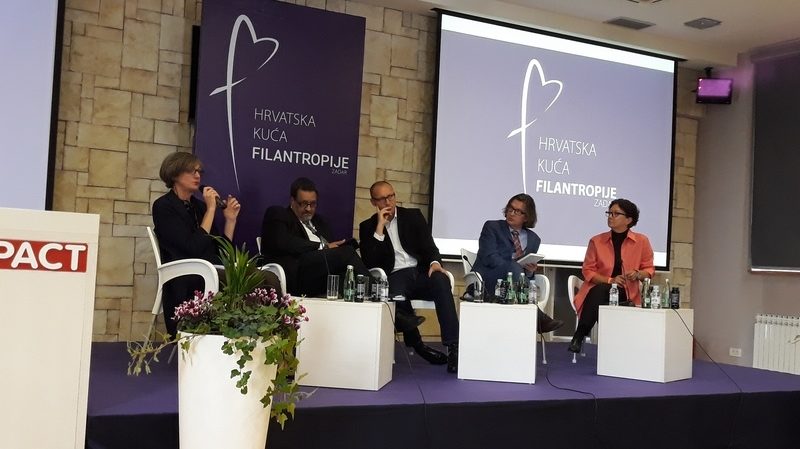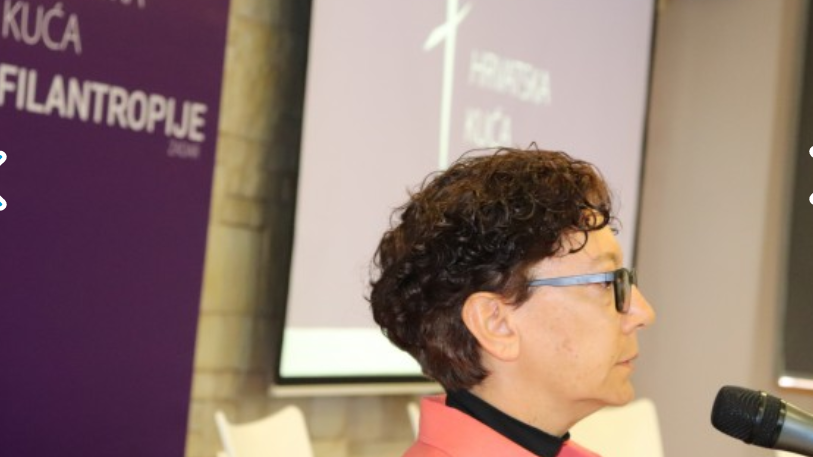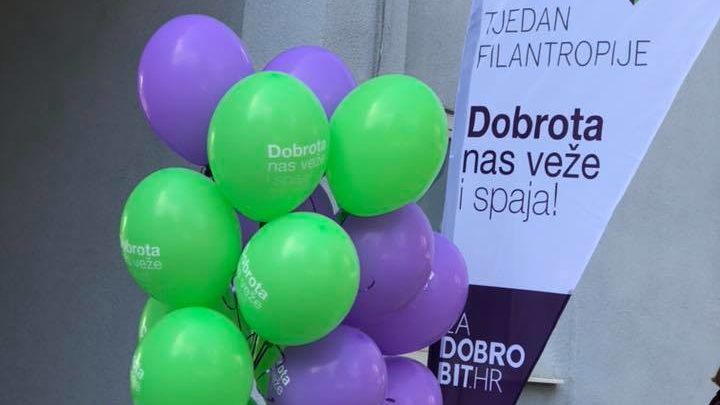Civil society’s ascent: An interview with Cvjetana Plavsa-Matic
by Joanna Pienkowska
In first two months of the Coronavirus outbreak, the European philanthropic community committed over €1.1 billion in emergency relief and mobilised local community response. The crisis deepened in Croatia when an earthquake struck Zagreb in March displacing 12,000 people.
Cvjetana Plavsa-Matic is leading the philanthropic sector in responding to Croatia’s double crisis. We discuss Cvjetana’s roots in the local community, her time in the Government, and the establishment of the National Foundation for Civil Society Development, as well as its response to the double crisis.
You started your career as a Programme Specialist for local communities in Zagreb. Did your experiences back then influence your thinking around your work today?
I am thankful for the experience in my own local community. I was born there, educated there, and then I was also employed there, so that was the best experience I could have. Everything I have managed to do in my career was based on that.
At that time, I was working with different groups in the community, with children, with young people, with elderly people. We organised different programmes for them in the premises of the local community. It was a time of socialism, but we were also very inclusive even in that time, so we worked with our local church, the Red Cross organisation, as well as with companies and institutions – that was a real cross-sector cooperation.
What kind of activities or projects did you implement?
Our local community had around 5,000 inhabitants and we organised a lot of different events and programmes based on the expressed needs of the local people. Among many different activities and programmes, I remember that the most popular was the Children Day Centre ‘Cricket’, where parents could leave their kids playing for a few hours in the day. We also had a Disco Club for the youth, Literary Evenings and even sport and music events for the elderly. It was nice to feel harmony and respect in the community.
How did this experience influence your work in the Government?
My colleagues in the Croatian Government used to say that I had “one leg in civil society, and another in Government”, because I really tried to balance between bureaucracy and the values of civil society.
All these experiences really helped me to be closer to people, to avoid being that ‘notorious’ bureaucratic, Government person. It was, and I believe still is, the only way to create new opportunities and solid relationships. It is important to build that trust, but also to appreciate the different roles in society.
After my work in the local community, I worked in the institutions of the Croatian Government. First, I was invited as ‘person from the field’ to work in the Government Office for Victims of War where I was in charge of collecting and processing data about children who were victims of the aggression on Croatia in the 90s, and establishing child recovery programmes in co-operation with local CSOs and international organisations like UNICEF and UNHCR. After that valuable experience, as a non-partisan person I was invited by Deputy Prime Minister in 1998 to head the newly established Government Office for Co-operation with NGOs.

What was the relationship between the Government and civil society like at the time?
It was a time of early development of democracy after achieving independence for Croatia, and there were no existing practices or experience of the relationship between Government and civil society. Civil society was not well developed and at the same time the Government was a bit suspicious of CSOs goals – we were even criticised by the international community at that time, because of this lack of trust from the Government towards civil society.
So, we had a huge task for our small Government Office for Co-operation with NGOs to create an enabling environment for a relationship between the Government and civil society in Croatia. We started from the perspective of untrodden paths, and just five years later we managed to create a system and a model that was replicated in all neighbouring countries, because it was a system that was truly supportive of civil society. We are very grateful to our colleagues from the UK, Netherlands, USA and other countries who helped us financially, but also by sharing their practice of various models for supporting the civil society.
How did you work towards this truly supportive system?
Two key words helped us in that effort: transparency and trust. Our Office published the first public call for proposals for civil society in Croatia. We also for the first time published the results of that call and introduced a system of reporting for civil society organisations that received public money.Nothing could be hidden, you had to be open, and if you made a mistake you learn from it and do better next time.
The first five years we spent in a centralised model. I am not a person who likes centralised models, but at that time with such mutual mistrust, we needed it. So the funds for grant-making programmes for civil society were allocated in our Office’s budget, and other ministries and Government bodies (except the Ministry of Culture and the Ministry of War Veterans) did not have separate funds for civil society, but were focused instead on collaboration with our Office. Together with them we annually published 13 different calls for proposals in areas like youth, health and social care, independent culture, the environment, elderly, democracy, and civil society development.
The biggest achievement during these centralised years was that we built the capacity for grant-making and for civil servants to cooperate with civil society. We created a transparent grant-making programme model, and thanks to that model we managed to continue supporting civil society after international donors left Croatia, in the early 2000s. At the same time, we gave enough space and support for civil society to develop and build its own capacities to be able to contribute to overall democratisation of Croatia.

When did you decide you were ready to transition out of the centralised mode?
In 2002 we had two turning points. One was the initiative to decentralise the model of support for civil society, because both sides – civil society and Government bodies – were ready to continue working together in their specific areas without the centralised role of the Government Office for Co-operation with NGOs. And the second point was a discussion about the need for an independent body that will continue to support civil society and democracy development in Croatia, because it is not appropriate for Governments to do that. That was the first building block for the establishment of the National Foundation for Civil Society Development.
In that same year, the Croatian Parliament passed the Law on Lottery, which created an opportunity for sustainable support of civil society. There was an article of Law establishing the obligation of the Government to allocate 50% of its income from the lottery to 8 different areas of civil society, one of which was civil society development. This was the second building block for establishment of the National Foundation for Civil Society Development, as it secured continued funding. Finally, the National Foundation was established as a public foundation in 2003, with a Management Board consisting of civil society representatives, as well as representatives from relevant ministries and local government bodies.
Our Foundation invests every year more that € 7 million, mainly in the areas like democratisation, organisational development of civil society, networking, non-profit media, ad hoc initiatives, social innovations, philanthropy, thematic networks, knowledge hubs, regional development of CSOs etc. Over the past 17 years, we have been receiving around 10-12% of that 50%, with the rest going to ministries which are using the procedures we put in place in the 90s to distribute this money.
Did becoming part of the EU impact your work in these areas?
We spent a lot of efforts and funds on training and networking to prepare our civil society organisations for the bigger opportunity of funding when we become a part of the EU. We tried to teach them how to create partnerships and how to work together, because these practices are crucial for getting stronger and becoming more able to apply to the calls for proposals within the EU funds. In 2012, we were even accredited by the EC as the Implementing Body for the EU funds for civil society in Croatia, because of our unique position and expertise. We have been doing this for eight years now, and we managed to channel almost € 150 million to civil society projects. In the meantime, in 2013 and 2014 we were also the Programme Operator for EEA and Norway grants as well, which was a nice experience for us and a very important funding opportunity for the Croatian civil society.

How has the daily work of the National Foundation adapted to the current isolation and the double crisis that hit Croatia?
From 16 March we worked from home and were effective in our work. We organised ourselves very well, used all our digital skills and equipment, and remained in daily communication with all our 354 beneficiary civil society organisations. The outbreak of COVID-19 was closely followed by an earthquake in the Zagreb area that also largely affected the daily operating of social life and infrastructure. We were flexible in responding to the needs of our grantees by approving changes in their programmes and working plans, as well as the needed reallocation of funds. We collected their comments and experiences during this time, be it through direct contact, ad hoc surveys, or by answering the needs expressed by members on other social/public platforms. This aid gave the CSOs a notion of belonging and solidarity that is always very important in such situations.
During the lockdown we were very effective, but we were missing each other. That was the problem. Because we are a good team, people who are really used to working together. We have a very strong level of understanding each other and helping each other – not only on the job, but even on a personal level. The average age of my colleagues is about 30, so the youngest person is 25 and the oldest is 60, but the majority is between 25-35. There is a lot of mutual support. And they like to work together, to celebrate all the successes from our private life as well as the work we are doing, so I think that what we missed the most was our physical work together.
Now we are step-by-step coming back to normality. We definitely have to be more positive. Not just sit and wait for what will happen to us but try to design what the world will look like after Covid-19. We must be proactive and positive, that is the most important thing.
I like the idea of trying to design the world we will be in post-Covid. Is this something that has shaped your work at the National Foundation?
Yes, when the crisis happened, we realised that it would be necessary to find a way to stabilise our communities, because they are the building block of all our activities. So, we moved from the first level intervention in responding to direct needs, towards recovery and resilience.
We sent a letter to our grantees – civil society organisations – and asked them to join us in creating the time after the Covid-19 so that we can be ready to help our communities to be sustainable after this crisis. In this letter, we wrote “let’s be proactive, let’s think about what will happen after isolation, let’s now create ideas and some kind of potential that we can continue to work on when the isolation finally stop and we are be back to – probably not the same as we had, but still – a new life.”
Why is the initiative called ‘the community potential’?
We realised how important it is to have resilient communities with their own production and own services embedded in the high level of social capital. This is why we call this initiative ‘Community Potential’.
Our communities have a lot of visible and invisible potentials, and we would like citizens and stakeholders in local communities to design and decide about its self-sustainability and the quality of life they want to have.
We started working at two levels – providing help to those in need and cooperating with people in the community who are already change-makers. We support them with different trainings through IMPACT: Euro-Mediterranean Academy for Philanthropy and Civil Society Development, which provide tools and skills, helping them to put their initiatives and their visions to practice. This is followed by financial support for the implementation costs.
We are also working with banks and foundations from Europe, with colleagues from the European Foundations Centre, DAFNE and the Global Fund for Community Foundations,so that we can find partners who are thinking like us. This could create a possibility to exchange our experiences, but also to create a pool of funds that could help our own initiatives or even go abroad. When you talk about self-sustainability of local communities and these distribution chains, we are at the same time talking about protection of the environment and our planet.
